Choosing the correct cleaner for your pool can seem like a daunting task. There are tons of different models by various manufacturers that range in style and in price. How does one narrow down such an extensive list?
When choosing the right cleaner, it is important to consider your pool size, shape, finish, debris type, and of course, your budget. Just because a cleaner is the most expensive does not mean it will be ideal for your pool setup.
Type of Cleaner
There are 3 different types of automatic cleaners that you can purchase: robotic, pressure, and suction. Although each cleaner type varies in multiple ways, they each provide advantages and disadvantages to the pool owner. Determining which one suits your needs the best while not breaking the bank is the ultimate goal.
Robotic Cleaners
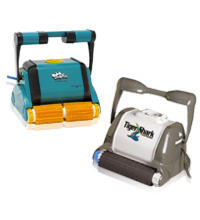
If you’re looking for a ‘plug and play’ style cleaner, a robotic cleaner is the way to go. Robotic cleaners run independently of your pool’s pump and filter system and can be used in small and large pools alike.
Because they do not require any additional equipment, they are also energy efficient.
Inside the cleaner, there is a small computer chip that learns the shape of your pool in an effort to clean the pool in the fastest, most efficient way possible. Although robotic cleaners can vary in performance and ability, they are all easy to install and use.
The higher-end models tend to climb walls and stairs and scrub walls up to the waterline. Optional “quick clean” features are sometimes included, giving the pool owners more flexibility in regards to cleaning times.
Advantages
- Uses 94% more energy than most pressure cleaners
- Suitable for most pool types, shapes, and surfaces
- Easy installation
- Stand-alone cleaner
- Handles some large and small debris
- Generally, has a longer warranty
Disadvantages
- Price
- More internal parts that can break
- Typically, not designed to run everyday routines
Robotic Cleaners Are Perfect For:
- Pool owners who are looking for a cleaner that runs independently of the rest of their pool equipment.
Suction Cleaners
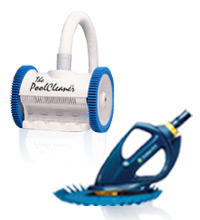
With the help of your existing pool pump, suction cleaners utilize the water flow from your filtration system to suck dirt and debris out of your pool. The debris is collected in a leaf canister or skimmer basket or is routed back into the filter system. In short, suction cleaners act as a moving pool drain.
Some suction cleaners may scrub your walls, but not all come with this feature. You will have to check the specs of the cleaner if you are interested in this feature.
In comparison, suction cleaners are the least expensive of the bunch and do not require any additional equipment.
Advantages
- Cleans pool floor efficiently
- Handles small to medium-sized debris, including sand and dirt
- Debris is collected in a leaf canister or diverted to the pool filter
- Most affordable cleaner option
- No real increase in energy consumption
Disadvantages
- Your pool needs to have a dedicated line for suction cleaners
- Has the potential to become a cleaning nightmare
- A dirty filter results in a poor cleaner
- Does not efficiently pick up large debris
- Takes suction away from your pool skimmers and main drain when in use
Suction Cleaners Are Perfect For:
- Vacuuming and cleaning the pool surface
- Picking up finer dirt and tough-to-reach areas
- Smaller-sized pools
- Pool owners interested in the basic cleaning features
Pressure Cleaners
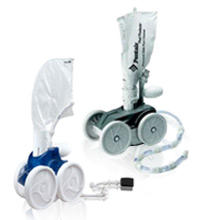
There are two different types of pressure cleaners: one that requires a separate booster pump and one that runs off of your existing pump. In both cases, though, they will operate the same.
Pressure cleaners work a little differently than both robotic and suction cleaners. Pressure cleaners use the pressure line from your system to push the cleaner around the pool. Once the debris is sucked through the cleaner, it is dropped into the cleaner’s debris bag.
Advantages
- Debris is collected in a self-contained bag
- Able to handle large debris without clogging
- Easy to handle and operate
- Suitable for all pool types and surfaces
- Possible to schedule cleaning with timer
Disadvantages
- A separate booster pump is required for most pressure cleaners
- Requires a pool pump to run
- In most cases, these cleaners will not climb all the way up the walls and they will not get to the tile line.
Pressure Cleaners Are Perfect For:
- Picking up large particles and debris
- Pool owners who prefer to have the cleaner on a timed cleaning schedule
- A pool with a heater as the cleaner helps to distribute the heat throughout the pool
- Scrubbing pool walls and floors
Pool Size
The size of your pool can help to determine which cleaner you need and which ones to avoid. For robotic cleaners, you want to make sure the cord length is long enough to reach the far end of your pool. Trust me, there is nothing worse than purchasing an expensive cleaner only to realize the cord isn’t long enough to clean your pool properly. Don’t forget to factor in the distance the power supply is from your pool and your pool’s depth. In this case, it’s always best to have too much cord than too little.
For pressure and suction cleaners, check the length of the hoses. The hoses need to be long enough to reach the end of your pool from your skimmer. Depending on the model, there may be additional hoses that you can purchase to get your desired length.
Pool Finish
Do you know what type of pool surface you have? If not, we recommend that you find out. It’s important to keep this in mind when purchasing a cleaner.
Although most cleaners today can handle all surface types, there are certain models that were made for specific pool surfaces. Alternatively,, in some cases, you can purchase additional cleaner pod shoes to make them compatible with your surface.
For fiberglass or stick tile pool surface, we recommend a robotic cleaner that includes super- grip PVA brushes.
Other Things To Consider
What exactly are you trying to clean?
Before starting your cleaner search, it’s important to have an understanding of what you’re trying to accomplish. Do you just need a cleaner to clean the pool floor? Or, do you need one that also goes up the wall to the waterline? You want to choose a cleaner that is a pro at whatever you’re looking to clean.
How much is your budget?
To be fair, not all pool cleaners are created equally. Sometimes, though, there is no correlation between performance and price. Pool cleaners can definitely run the gamut in terms of performance and price. So, don’t fret if you can’t purchase the cleaner you really want due to the price. I guarantee that you will be able to find a different cleaner that accomplishes the job you are looking to clean.




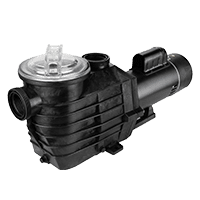
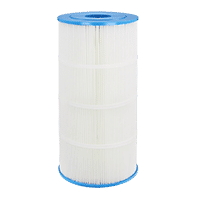
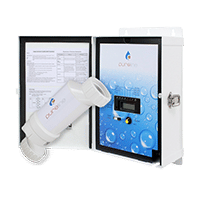
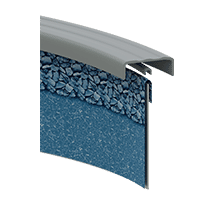
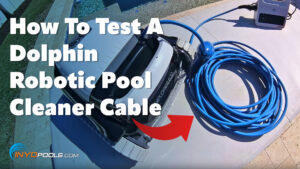
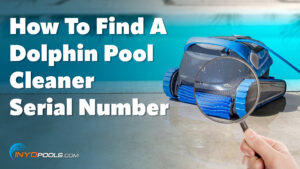
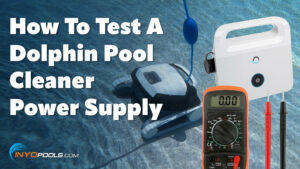

Leave a Reply